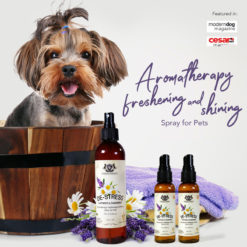Key Takeaways
Lavender, chamomile, and cedarwood oils are safe and beneficial for pets.
Essential oils can calm anxious pets and improve their overall well-being.
Always dilute essential oils before using them on pets to avoid adverse reactions.
Aromatherapy has been supported by various studies for its calming effects on animals.
Consult with a veterinarian before introducing any new essential oils to your pet’s routine.
The Safest Aroma Oils and Their Benefits for Pets
When it comes to our furry companions, their safety is paramount. Many pet owners have turned to essential oils to help soothe and relax their pets. But not all oils are created equal. It’s crucial to know which essential oils are safe for pets and how they can benefit from them.
“Natural Dog Pet Odor Eliminator Spray …” from www.gerrardlarriett.com and used with no modifications.
Lavender Oil for Calming Pets
Lavender oil is one of the most popular and safest essential oils for pets. Known for its calming and soothing properties, it can help reduce anxiety in dogs and cats. Imagine a car ride with a nervous pup; a few drops of lavender oil can make the journey much more pleasant.
Besides calming anxiety, lavender oil can also aid in relieving pain and promoting better sleep. To use it safely, dilute a few drops in water or a carrier oil and gently massage it onto your pet’s fur. Alternatively, you can use a diffuser to disperse the scent into the air.
Chamomile Oil Effects on Pets
Chamomile oil is another excellent option for pet aromatherapy. It’s known for its anti-inflammatory and calming effects, making it perfect for pets with skin irritations or stress. Chamomile can be particularly beneficial for pets recovering from surgery or illness, as it promotes relaxation and healing.
“Chamomile oil can be a gentle yet effective remedy for pets experiencing stress or inflammation. Its calming properties are well-documented, providing a natural solution for pet owners.”
To use chamomile oil, mix a few drops with a carrier oil and apply it to your pet’s skin or use it in a diffuser. Always monitor your pet for any signs of discomfort or allergic reactions.
Cedarwood Oil in Pet Relaxation
Cedarwood oil is another safe and effective essential oil for pets. It has natural insect-repelling properties and can also help calm and relax anxious animals. Cedarwood oil can be particularly useful for pets that spend a lot of time outdoors, as it can help keep pests at bay while promoting a sense of calm.
To use cedarwood oil, you can add a few drops to your pet’s collar or bedding. This will allow the scent to be released gradually, providing a calming effect throughout the day.
How to Safely Use Essential Oils Around Pets
Using essential oils around pets requires careful consideration and proper application. Here are some guidelines to ensure your pet’s safety:
Always dilute essential oils with a carrier oil before applying them to your pet’s skin.
Introduce new oils gradually and monitor your pet for any signs of adverse reactions.
Use a diffuser to disperse essential oils into the air, ensuring proper ventilation.
Consult with a veterinarian before starting any new aromatherapy routine.
By following these steps, you can safely incorporate essential oils into your pet’s care routine, enhancing their well-being and creating a more peaceful environment.
Real-Life Success Stories of Aromatherapy
There are countless stories from pet owners who have witnessed the transformative effects of aromatherapy on their beloved animals. Take, for instance, the story of Max, a 5-year-old Labrador who suffered from severe separation anxiety. His owner, Sarah, began using lavender oil in a diffuser during the day while she was at work. Within weeks, Max showed significant improvement, appearing more relaxed and less anxious when left alone.
Another success story involves Bella, a senior cat with arthritis. Her owner, Tom, applied diluted chamomile oil to her joints, which not only helped reduce inflammation but also improved her mobility. These real-life examples demonstrate the potential of essential oils to enhance the quality of life for pets.
The Best Essential Oils to Calm Pets
When it comes to calming pets, certain essential oils stand out for their effectiveness and safety. Incorporating these oils into your pet’s routine can make a noticeable difference in their behavior and overall well-being.
Let’s explore some of the best essential oils known for their calming properties and how they can be used effectively.
Benefits of Frankincense Oil
Frankincense oil is revered for its grounding and calming properties. It’s particularly beneficial for pets that experience stress or hyperactivity. This oil can help create a serene environment, making it easier for your pet to relax.
To use frankincense oil, you can add a few drops to a diffuser or mix it with a carrier oil for topical application. It’s important to ensure the oil is well-diluted to prevent skin irritation. By introducing frankincense oil into your pet’s routine, you can help them find peace and tranquility. For more information on how to use essential oils safely with your pets, check out these safety tips.
Using Valerian Oil for Anxiety
Valerian oil is a powerful natural remedy for anxiety. Its sedative effects can help soothe pets that are easily agitated or have difficulty settling down. Valerian oil is particularly useful during stressful events, such as thunderstorms or fireworks.
When using valerian oil, start with a small amount and observe your pet’s reaction. You can apply it to their bedding or use it in a diffuser. It’s crucial to monitor your pet closely, as some may be more sensitive to the effects of valerian oil than others.
Patchouli Oil’s Soothing Properties
Patchouli oil, known for its earthy aroma, offers soothing properties that can benefit both pets and humans. It is particularly effective in calming pets that are prone to nervousness or restlessness.
To use patchouli oil, consider adding a few drops to a diffuser or mixing it with a carrier oil for a gentle massage. This can help create a calming atmosphere and reduce tension in your pet. Patchouli oil is a versatile option for pet owners seeking a natural way to promote relaxation.
Safety Tips and Considerations for Pet Aromatherapy
While essential oils offer numerous benefits, it’s essential to prioritize safety when using them around pets. Understanding how to use oils properly can prevent potential adverse reactions and ensure a positive experience for your furry friend.
Understanding Appropriate Dosages
Determining the correct dosage of essential oils for pets is crucial. Overuse can lead to negative effects, while too little may not provide the desired benefits. As a general rule, always start with a low concentration and gradually increase as needed. For more information, you can refer to this guide to pet aromatherapy.
For topical application, dilute essential oils with a carrier oil such as coconut or olive oil. A typical dilution ratio is one drop of essential oil per teaspoon of carrier oil. This ensures the oil is safe for your pet’s skin and minimizes the risk of irritation.
Recognizing Signs of Allergic Reactions
Pets, like humans, can have allergic reactions to certain substances, including essential oils. It’s vital to recognize the signs of an allergic reaction, which may include itching, redness, swelling, or changes in behavior.
If you notice any of these symptoms after introducing a new essential oil, discontinue use immediately and consult your veterinarian. It’s always best to perform a patch test before applying oils more broadly, ensuring your pet’s safety and comfort.
Avoiding Certain Oils in Pet Aromatherapy
While essential oils can offer numerous benefits, not all oils are safe for pets. Some oils can be toxic and should be avoided at all costs. For instance, tea tree oil, while beneficial for humans, can be harmful to pets if ingested or applied in large quantities. Similarly, oils like eucalyptus, cinnamon, and citrus can cause adverse reactions in pets, including vomiting, diarrhea, and skin irritation.
To ensure your pet’s safety, always research an essential oil before using it around your pet. It’s crucial to consult with a veterinarian, particularly if your pet has existing health conditions or is on medication. By being informed and cautious, you can safely incorporate aromatherapy into your pet’s routine without risking their health.
Conclusion: Enhancing Pet Wellbeing Naturally
Incorporating essential oils into your pet’s life can be a rewarding and effective way to enhance their wellbeing. With the right oils and proper usage, you can create a calming and healing environment for your furry companions. Essential oils offer a natural alternative to traditional methods, providing a gentle yet powerful way to support your pet’s health and happiness.
Summary of Key Benefits and Safe Practices
Essential oils like lavender, chamomile, and cedarwood can safely calm and soothe pets. They can reduce anxiety, promote relaxation, and even aid in healing. However, always ensure proper dilution and monitor your pet’s reaction to new oils. Consulting a veterinarian can provide additional guidance tailored to your pet’s specific needs.
Encouragement for Responsible Usage
As pet owners, we strive to provide the best care possible for our beloved animals. By choosing essential oils carefully and using them responsibly, we can enhance our pets’ quality of life. For more guidance, refer to this definitive guide to pet aromatherapy. Remember, each pet is unique, and what works for one may not work for another. Patience and observation are key to finding the right balance.
Embrace the power of nature and explore the benefits of aromatherapy for your pet. With the right knowledge and approach, you can create a harmonious and nurturing environment that supports your pet’s physical and emotional wellbeing.
“Aromatherapy can transform your pet’s life, offering a natural path to peace and wellness. With careful selection and mindful application, essential oils can be a valuable addition to your pet care toolkit.”
Frequently Asked Questions
Pet owners often have questions about the safety and effectiveness of aromatherapy for their furry friends. Below are some common inquiries and answers to help guide you in making informed decisions.
Is aromatherapy safe for all pets?
While many pets can benefit from aromatherapy, it’s essential to consider each animal’s unique needs and sensitivities. Some pets may be more sensitive to certain oils, and what works for one may not work for another. Always start with a small amount and observe your pet’s reaction.
“Consulting with a veterinarian can provide valuable insights into which essential oils are safe for your specific pet. It’s always better to err on the side of caution when introducing new substances into your pet’s environment.”
Most importantly, ensure that any oils used are pure and free from additives that could harm your pet. Using high-quality oils and proper dilution can significantly reduce the risk of adverse reactions.
What signs indicate a pet dislikes an essential oil?
Pets have their own way of communicating discomfort or dislike. Signs that your pet may not tolerate an essential oil include sneezing, coughing, excessive scratching, or changes in behavior such as hiding or agitation. If you notice any of these signs, discontinue use immediately.
Monitoring your pet’s body language and behavior can provide clues about their comfort level with a particular oil. Trust your instincts and your pet’s signals to guide your decisions.
Are there any essential oils that are toxic to certain pets?
Yes, some essential oils can be toxic to pets, including tea tree, eucalyptus, cinnamon, and citrus oils. These oils can cause a range of symptoms from mild irritation to severe toxicity, depending on the amount and method of exposure.
It’s crucial to research and consult with a veterinarian before introducing any new essential oil to your pet’s environment. Avoid using oils that are known to be harmful and always prioritize your pet’s safety above all else.






